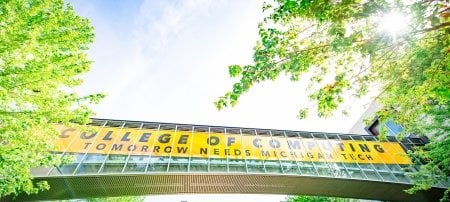Digital communication matters — maybe now more than ever. That’s why the Michigan Technological University tutors who teach folks how to clear technological obstacles are getting back to BASIC Saturdays.
BASIC, the Building Adult Skills in Computing program, is offering online sessions from 10-11 a.m. every Saturday from April 4-25. The program, now in its 10th year, welcomes technological newcomers as well as anyone looking to expand their digital skills.
The use of video chat and video conferencing surged recently due to the COVID-19 outbreak and Michigan’s Stay Safe, Stay Home executive order; for many, the only way to safely touch base with friends, family, and co-workers is online. BASIC tutors — both students and faculty — are uniquely equipped to ease people into these technologies. Among several video communication options, BASIC will introduce people to a platform called Zoom, which is used extensively at Michigan Tech.
How to Connect to a Michigan Tech BASIC Tutor
All it takes is a phone call. Here’s the process for adults who want help with videoconferencing
or other tasks ranging from those annoying “storage full” messages to setting up their
new tablets:
1) At 10 a.m., call Zoom from your phone at 1-312-626-6799.
2) You’ll be prompted to enter the meeting ID number, which is 8191378642. Then enter
the # sign.
3) You’ll be prompted for a participant ID. Just press the # sign.
4) Let the BASIC tutors take it from there.

Charles Wallace, associate professor of computer science, co-leads the program with Kelly Steelman, associate professor of human factors and psychology. Wallace said he’ll serve as “switchboard operator” for the Saturday call-in, getting everyone assembled then directing tutors and students to their individual meetings.
Tutor and computer science graduate student Ann Ciesla said she was thrilled to hear the BASIC program would continue through spring semester. “We have a lot of people come to our sessions who are afraid to do something on their computer,” she said. “Just a reminder: You will not blow up your computer. You may make some mistakes, but you can recover from them.”
"This is a great learning opportunity for you, since it will teach you how to video chat with your friends and family, which is a good skill to have during these times."
Researchers have found that one-on-one sessions are most effective. Normally those take place at Portage Lake District Library in Houghton.

“The library is our friend, and a trusted source for a lot of people. Even though we’re not there, we feel like we are in spirit,” Wallace said, adding that he initially worried that not meeting in person would be an obstacle. “I had this barrier in my head — what if people can’t get online to get in touch with us? But Kelly (Steelman) wisely said, ‘Why not give it a shot?’ We can still do a lot using video conferencing — we can even share screens and see what is happening as we help people. And learning how to use Zoom is a useful skill in itself — you can use it to stay in touch with friends and family.”
"COVID-19 has temporarily isolated us, but digital technology can step in to help keep us together. Our BASIC tutors can get people started and help them feel comfortable and connected online."
Ciesla said tutors benefit from the program, too. “I really enjoy meeting with people who come in for help on Saturdays. We always have good conversation, not just about technology, but also about Houghton, Michigan Tech, the weather, or whatever else is going on at the time,” she said. “It is very rewarding, since people are so excited about their newfound knowledge. We have many people who come back regularly, and it's fun to see them progress in their understanding.”
She hopes both regular and new learners will take advantage of this opportunity.
“I was sad to think about the people I met with before spring break who were so excited to come back and learn more, and how we would have to put their learning on pause until next fall. Moving the program online offers people the chance to continue (or start) their learning, which is really exciting.”
Michigan Technological University is an R1 public research university founded in 1885 in Houghton, and is home to nearly 7,500 students from more than 60 countries around the world. Consistently ranked among the best universities in the country for return on investment, Michigan's flagship technological university offers more than 120 undergraduate and graduate degree programs in science and technology, engineering, computing, forestry, business, health professions, humanities, mathematics, social sciences, and the arts. The rural campus is situated just miles from Lake Superior in Michigan's Upper Peninsula, offering year-round opportunities for outdoor adventure.






Comments